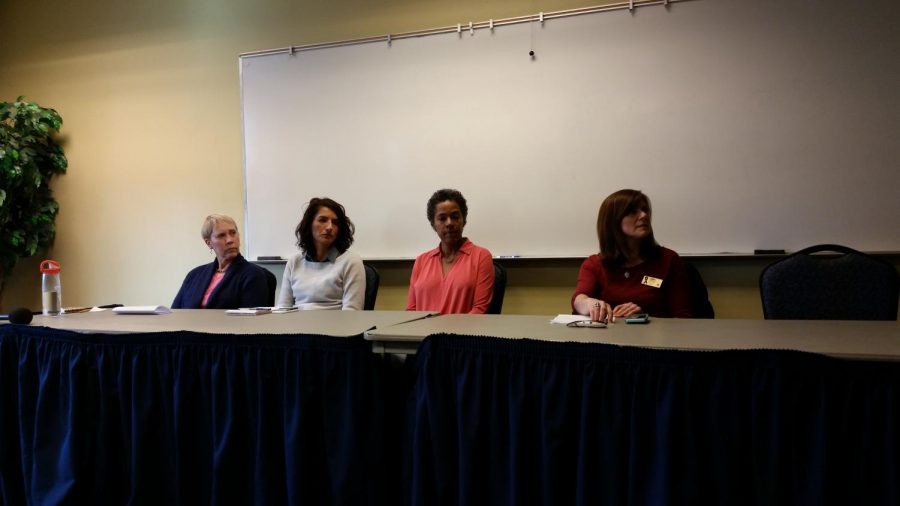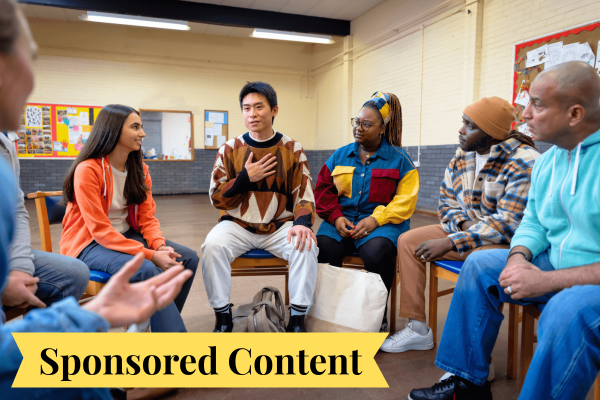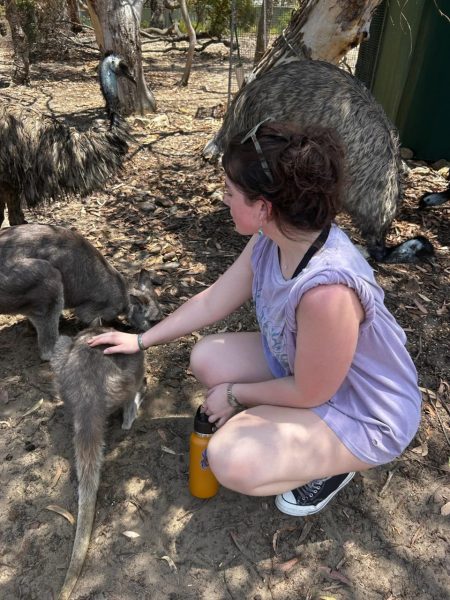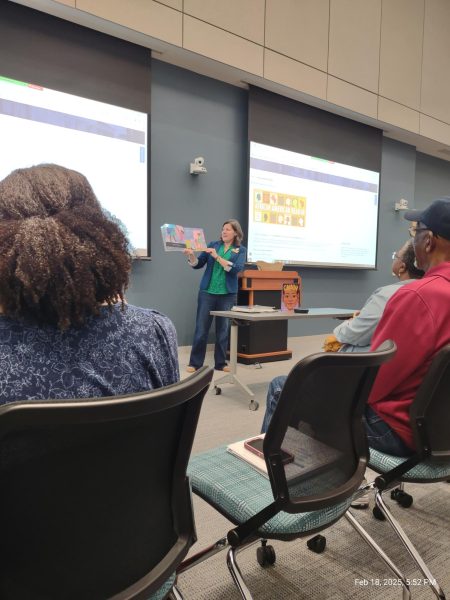#MeToo Panel held on UNCW’s campus
Casey McAnarney | The Seahawk
The #MeToo panel consisted of four female faculty/staff members (from left to right): Dr. Candice Bredbenner, Dr. Edelmira Segovia, Dr. Candace Thompson and Jenny Adler.
As students walked into the Wrightsville Beach Room in Fisher Student Center for the #MeToo Panel on Jan. 24, a panel of four female faculty and staff members sat in the front of the room and a table of free pins, stickers and flyers were on the side next to the rows of chairs. The room filled up rather quickly, with only a handful of seats left empty by the start of the panel.
The four panelists were announced by the moderator of the event, Dr. Katherine Montwieler of the Women’s Studies and Resource Center. The panelists were: Jen Adler, director of UNC Wilmington’s Collaboration for Assault and Response Education [CARE]; Dr. Candice Bredbenner, an associate professor and and undergraduate coordinator for the Department of History; Dr. Edelmira Segovia, director of Centro Hispano; and Dr. Candace Thompson, an associate professor in the Watson College of Education. One panelist could not make it due to a meeting with Chancellor Jose V. Satarelli; this was Amber Resetar, the director of Title IX and Clery Compliance at UNCW.
Introduction of panelists and discussion of issue at hand
To start the panel, Dr. Bredbenner gave a historical context to the issue of sexual assault. She began by noting that the term was coined in the 1970s, though it has long been an issue for women in the world. Dr. Bredbenner discussed the narrative of Harriet Jacobs, a slave who published her story of escaping her sexually predatory master.
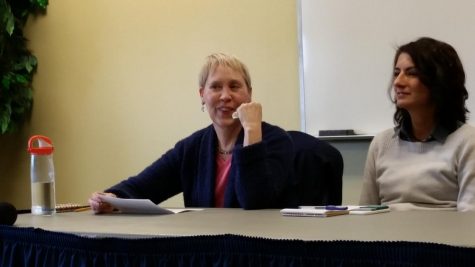
She also discussed the story of Anita Hill, a U.S. attorney and academic, who testified before Congress about her experiences with Clarence Thomas prior to his appointment to the Supreme Court. In these hearings, Hill said that Thomas had sexually harassed her while being her supervisor at both the Department of Education and the Equal Employment Opportunity Commission [EEOC]. Thomas was sworn in on Oct. 23, 1991.
Impacts of Hill’s words include the rise in cases being brought to the EEOC in the 1990s as well as the record number of women running for office, according to Dr. Bredbenner. The year 1992 was dubbed “Year of the Women,” though the number of women in office tripled to only six.
Then the conversation turned to discuss current issues facing women in North Carolina, specifically those of migrant workers and members of immigrant populations. Dr. Segovia discussed North Carolina’s role as a large migrant and factory working state, with many of these individuals living in Duplin County, Smithfield and Murphy.
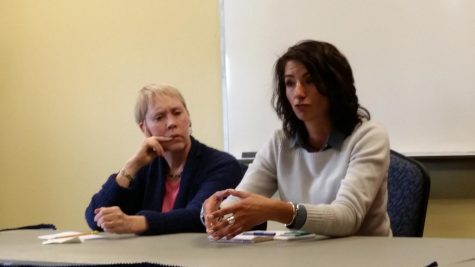
“With us [N.C.] continuing the legacy of being an agricultural state,” Dr. Segovia said, “we have had a large immigrant community…we continue to have a large farm labor community. The implications for particularly women working in the field are multiplied. They continue to be assaulted without having an outlet. We know that we have a broken immigration system. We know that they are working in the fields without documentation, which makes them perfect targets to continue to be assaulted.”
Dr. Segovia said that many of these women experience threats from their attackers, some including threats to involve immigration officers or removing them from their places of employment. This can have a negative impact, especially if this woman is the head of her household.
She also discussed her personal experiences of witnessing assault in immigrant communities. In these instances, Dr. Segovia saw adolescent girls at school — “12 to 14, for example” — having become impregnated by men 18 and older. This was during her work in the public school system about five or six years ago. And when teachers would hand these cases to the law enforcement, they would merely say that it was a “cultural thing.”
“‘They are coming from Mexico,'” Dr. Segovia said as she mirrored what law enforcement said. “‘You marry young, you have children young. And so we are not going to touch it.'”
There are resources for women in these positions, Dr. Segovia said. Some of this relief can come from immigration attorneys, who can discuss options for these women. On option is the U nonimmigrant status [U visa], which is a nonimmigrant visa that can be awarded when a victim of a crime assists law enforcement or government officials in the investigation. According to the U.S. Citizenship and Immigration Services website, 61,686 petitions for a U visa were received in 2017; of that number, 17,726 were approved and 3,773 were denied. There were 190,361 pending petitions at the end of the 2017 fiscal year.
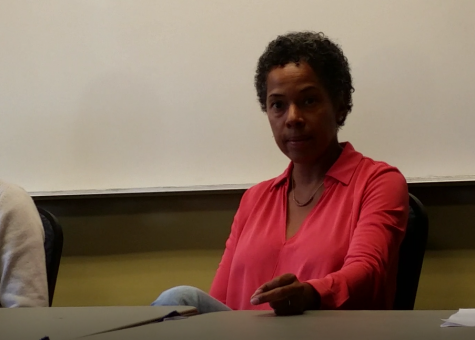
Dr. Candace Thompson discussed the issues surrounding the #MeToo movement, namely the level of inclusivity and intersectionality the movement takes.
After Dr. Segovia spoke, Dr. Candace Thompson of the Watson College of Education turned the discussion towards a new topic: the implications of the #MeToo movement. When viewing the #MeToo movement, Dr. Thompson said she thinks “#MeWhere?”
The #MeToo movement was started by Tarana Burke, an African American woman, in 2006 on MySpace in order to promote “empowerment through empathy.”
“We need each other,” Dr. Thompson said. “It cannot be ‘me too’ if it only benefits me.”
People are finding their voice, Dr. Thompson explained, “but not all, as we heard from Candice and Edel that there are still many, historically even, whose voices heard, whose experiences remain in the shadow. So, as we talk about the #MeToo movement, as we participate in it from our own spaces, look around you and find out who is included and you widen that net.”
Resources on campus
The final panelist, Jenny Adler, is the director of CARE on campus and focused her discussion on the resources available to students on campus. “Our campus is fortunate that we have CARE as a resource.”
Adler said that the CARE office employs six professional staff: two full-time victim advocates, two full-time employees working on prevention and peer advocates. The office works with the Title IX system in order to address these issues in order to empower victims to know what resources are available to them and to make campus safe, according to Adler.
Adler also mentioned the new electronic means of reporting that the university has been using. Back in September of 2017, The Seahawk’s Meredith Hoffman reported on this application, called Callisto, and how it aims to allow women to report legally on their case. For more information, read Hoffman’s article here.
Adler also acknowledged that though the #MeToo movement faces many implications, it can be used as a force for good. There are women of privilege who can champion this cause and “make change.”
“No one will victim blame Gwyneth Paltrow or ask what she was wearing,” Adler said.
Following the panel, a question and answer portion was held where students and community members asked the panelists for their thoughts on issues and topics revolving around sexual assault. The forum then concluded with many young female students flocking toward the panelist to further the conversation.


